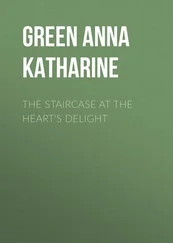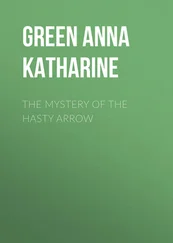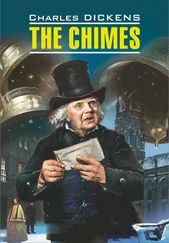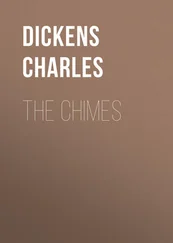Then I remember that Lucien is in there somewhere, playing. The notes run clear and smooth, and somehow I have to believe that it’s going to be all right. He is going to survive.
After the origins of memory, Lucien plays the world before Allbreaking and then the birth of Ravensguild.
Different voices talking. Folksongs. Forecasts. There’s no grand structure. No sonata form, no canon. Just the individual stories coming and going, different currents. Which is not to say there is no harmony or repetition. The same things circle round in their own ways. Babies are born. People are married and die. Songs for planting and songs for harvest, patterns for journeys forward and back. I let myself look up a little from where I’ve been crouched forward, my head on the floor.
The magisters are still around the table. They are staring all of them at the magister musicae, who is listening with his arms outstretched as if holding captive the attention of a vast orkestra. Then he points to the Carillon’s chambers. He bellows, a bullish, strange sound, ‘Stop the instrument!’
Three of the magisters jump out of their seats and run to the door.
I dip my head again. ‘Hurry, Lucien,’ I whisper to the floor.
I hear the shift in the tune in my head before he plays it. Part of me wants it to stop there. Maybe we all want time to stop, or to be coming the same always. But I know it can’t. Under the green melodies that we carved out and practised together, I can hear the dark rumbling of what happens next.
Fire starts and it burns books, maps, stories, documents. It burns old electricks. It burns memoryboards and paraboards. It burns music, old scores from before Allbreaking.
And it burns memories too. In the music, I hear the flames leap up, hungry. Crashing, devouring, turning code to dust and ashes.
Lucien plays the lives cut short, fragments of story riddled with the black wormholes of sated flame. He plays the memorylost herded, the minds wiped clean, the frenzied dance of chimesickness. He plays the dead of Ravensguild. He plays mouths stuffed with dead birds.
The music gets louder and louder. Some of the magisters still sitting at the table are bending their heads and covering their ears, their mouths open in sounds I cannot hear. Their despair not at the music’s volume, but the blasphony of it, the mess. The music gets louder and louder, but the playing is triumph. I hear every note as we wrote it and it makes me think of what Lucien said about meditation. How you can hear the forward and backward of a note as if you were bringing it into being. And I hope. I hope that some miracle means his skill is strong enough.
In the music, something else is coming in. I hear it once and at first think I am mistaken. It is something not part of the melody or harmony we made. Something not part of the Carillon’s voice at all. It is a sound like you hear on the race sometimes in a high wind, when the boats that are still docked there strain against the wood and rope and rubber of their berth. A kind of resentful creaking. The sound of something yearning to pull apart.
The frenzied melody continues. Death and breaking. I know the fragmented violence of the rhythms so well that I am holding my breath.
And then wrong notes come.
Not just the ones we have written, the known dischords, but other notes, notes not intended. Notes stumbled. Two into one. One into two. The wrong chord. Notes missing. The devil in music held long and awkward and loud. The augmented fourth shrieks like pain through the hall and I see several magisters shrieking too, as if they’re vibrating in sympathy with the instrument.
The rending sound comes again as the pitch gets higher and higher, louder and louder.
Through the din I can see the magister musicae gesturing wildly in solfege, his arms moving like a crazed windmill. And something calm comes into my head. A still spot. A voice. It says, The Carillon can’t withstand this .
I stand up. I hold my hands over my ears. I think of Lucien in the tonic chamber and there are tears running down my cheeks.
Then silence. In the silence, creaking and a sound I can’t describe. A slow sound of something falling. An arc of silver planing through the air, and then a crash. I feel the whole hall shake from the ground upward. The noise pushes me down.
Then the instrument resumes like a fallen horse stumbling back up to its knees. What I hear then is awful in its volume and harshness.
A chord, then another, then another. Cruel, pitiful, violent. The Carillon is playing a mockery of Chimes. Chimes through a black mirror of dischord and heaviness. It pushes and pushes through the rending, as silver crashes all around and as the pipes and bells of the instrument pull apart from each other. Until there is nothing left, only silence, only despair.
I think, How could you leave me like this, Lucien?
The story we wrote had a different end. The cruel mirror of Chimes was meant to end in a different song, a new one that Lucien wrote to mean hope and hereafter. But there is no one to play it anymore.
I get up slowly. The arches still stand upright, but along the left side of the hall, they stretch up into air like hands held in supplication. The roof is broken. Slicing through the immense hole is the silver lip of an immense bell, deformed and broken by the weight of its fall. Huge splinters of wood have come with it, piles of rubble and stone and white tiling. Dust rises up through the air.
Silence. Creaking, and the intermittent crashes of debris still falling. Wind plays through the hall from the broken walls and ceiling.
‘Lucien,’ I yell forte. My lungs are useless. I get up and run down the hall and toward the damage. I run toward where I saw Lucien disappear into the stair that rises to the tower. Though I know that there is little chance anyone in the chambers could have made it out alive.
The opening of the stairway is covered with rubble. I find a thick piece of wood and use it to wedge and lever the heavy concrete blocks aside. Then I push the door open. Fallen debris has broken through the inner wall of the stairwell, so the steps are held by one side only, splayed like the struts of a fan. Through the broken ribs to my right I see the silver pipes that formed the instrument’s core. I keep one hand on the outer wall and climb the stairs, pushing over the rubble. Up some way I go and there is an opening to my left, from off the stairwell. One of the chambers of the instrument. I crawl into the carved narrow room. Its outer wall has been shorn clean off and it has collapsed inwards, catching and trapping Magister Joachim where he was trying to escape. From his waist down he is covered in rubble. One of his arms is broken, and his face is turned to me in profile. It is covered in white dust like flour and for a moment I think of my mother making bread. His eyes look surprised. Blank. Blood in a line from his mouth. I try to pull his cloak over him, but it’s caught on rubble, so I gently thumb his eyelids closed instead.
Then I return to the stairs. As I get higher, they become more unstable; they creak with pain as I crawl. At last it is impossible to climb any higher. Dust clouds around me like smoke. My eyes are running with it, and my lungs are full. Then I look up. Hanging above is a skewed platform with no visible means of support. It must be attached somehow to those of the silver pipes that are still upright. And I know that it must be the floor of the tonic chamber.
I force myself along the creaking tongue of the step on which I’m standing. I stand at its edge and it gives with a sickening downward flex. Then I jump. I jump upwards and into the fretting that holds the instrument’s remaining pipes. The core of the destroyed Carillon. Its backbone. I use it as a ladder, and I climb upward. Up into dust and blindness.
Читать дальше
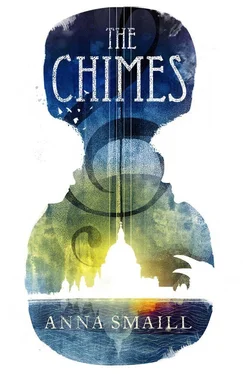

![Чарльз Диккенс - Колокола [The Chimes]](/books/395589/charlz-dikkens-kolokola-the-chimes-thumb.webp)




